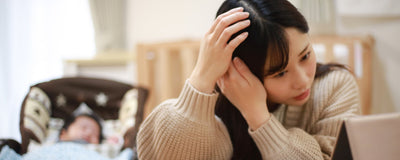Did you know that getting enough good sleep isn’t just about feeling rested — it can also be key to hair growth and health. So, if you’re struggling with hair thinning, or just want to keep your locks at their best, getting in some quality beauty sleep for your hair could make a big difference.

Bottom line, good quality sleep supports many of the vital processes that keep you and your hair looking and feeling your best.1 Let’s dive into the science of how your sleep quality and hair health are connected:
Why Your Hair Needs Its Beauty Sleep
Who doesn’t love waking up after a good night’s sleep looking rested and refreshed? Beauty sleep earned its name because quality sleep is integral to many key processes including your body’s ability to produce healthy levels of collagen – a vital component in your skin elasticity and your hair growth.

Sleep isn’t just about avoiding tiredness, it’s your body’s way of repairing itself. During deep sleep phases, your body release hormones that repair tissues, strengthen your immune system, and support hair growth.
Here’s how sleep boosts the hormones that affect healthy hair growth:
✅ Growth Hormones: these are synthesized mostly during deep sleep, helping your body and your hair follicles with tissue repair.
✅ Cortisol: this stress hormone can affect your sleep quality, so high stress can negatively impact hair growth.2
✅ Androgens: these hormones rise during sleep and stimulate the transformation of fine, vellus (baby) hairs into thicker, pigmented strands.
When your sleep cycles are disrupted — whether by insomnia, sleep apnea, stress, drug and alcohol use, or staying up late — these hormones can go out of whack, and cause issues with your hair growth and health.
How to Have Good Sleep And Great Hair
In an ideal world, sleeping like a baby would be the standard. Unfortunately, stress, work hours, social schedules, noise, and health issues can easily play havoc with your sleep quality. And that can show up in your hair.
Here’s how sleep + proactive haircare = healthier scalp and hair:
1 – Reduce Stress:
Yes, stress and hair loss can go hand in hand. High levels of the stress hormone cortisol can trigger hair shedding and thinning (telogen effluvium). The good news is that it doesn’t have to be permanent – if you can get your stress levels down, then you should sleep better and your hair growth should improve.
Arey’s Trichologist (haircare expert) tips for reducing stress:
-
-
A scalp massage with a specialized brush can help with relaxation and prepare you for deep, nourishing sleep. And it’s something you can do at home.
-
Boost your de-stressing scalp massage with a serum like To The Root®. To The Root® delivers hair growth-boosting nutrients right where you need them the most – your roots.
-
Practice healthy sleep habits like regular bedtimes and less screen time before sleep.
-
Read more here about giving yourself a relaxing detox scalp massage.

2 – Reduce Inflammation and Oxidative Stress:
Sleep deprivation can lead to an imbalance of free radicals – unstable molecules that can damage cells, including your hair follicles. Free radicals trigger a process known as oxidative stress that can cause inflammation at a cellular level.3 Damage from oxidative stress can directly impact your hair at the roots and may lead to weaker hair or increased shedding.4
The importance of antioxidants in managing inflammation and oxidative stress:
-
-
Antioxidants combat free radicals that can cause inflammation in the cells inside your hair follicles (roots).
-
Bad quality sleep can leave your hair follicles vulnerable to oxidative stress by causing a drop in melatonin production – a powerful antioxidant that protects against oxidative stress
-
The inflammation triggered by oxidative stress is the cause of many chronic diseases, so your overall health is also going to benefit by eating an antioxidant-rich diet. Antioxidants can reduce the damaging effects of oxidative stress on your body and your hair. That’s why taking an antioxidant-rich hair health-specific supplement like Not Today, Grey can boost your hair health — and your overall health.
Here’s an example of what you’d have to eat each day to match a daily dose of Not Today, Grey:

Read more here about the hair health benefits of an antioxidant-rich diet

3 – Boost Blood Flow to Your Hair Roots:
Conditions like sleep apnea have been associated with increased hair shedding, possibly due to disrupted blood flow to your scalp tissues – and that can mean less nutrient-rich blood reaching your hair follicles.

Here are some ways to boost blood flow to your hair roots:
-
-
Short term with side effects: topical treatments like Minoxidil are designed to increase blood flow to your hair follicles, allowing them to receive more oxygen and nutrients, which can stimulate hair regrowth. Unfortunately there can be side effects to any medication, and your new hair growth will be lost once you stop taking it.
-
Long term with no side effects: scalp massage is a safe and effective way to increase blood flow to your scalp. You can boost any massage by using a nourishing exfoliant like Scrub that also benefits your overall scalp and hair health.
-
Massaging your scalp with your fingertips is easy to do at home, and you only need a few minutes a day to see results. You can give yourself a scalp massage while using Scrub or when you are washing your hair. Read more here about giving yourself a detox scalp massage.

What Is a Healthy Sleep Cycle?
Understanding your sleep cycle is a good way to begin getting the beauty sleep that your hair needs. Here’s what you need to know:
The three main stages of a healthy sleep cycle:
-
-
Light sleep: this is the stage when your brain consolidates and organizes the information from your day. Most of your night’s sleep is spent in this stage.
-
Deep sleep: this is known as slow-wave sleep and is when your body releases most of your growth hormones.
-
REM (Rapid Eye Movement) sleep: this ideally makes up about 25% of your sleep time and is when your sleeping brain is busiest and when you may have vivid dreams.
-
A person with a healthy sleep cycle will go through several 70-100 minute rotations of these stages through a night’s sleep.5
Because Your Hair Health Reflects Your Overall Health
How you take care of your hair is reflected in your overall health. That’s why Arey prioritizes clean haircare. We follow the Credo Clean guidelines and we don’t use ingredients that are toxic to you or harsh on your hair and scalp skin. Read more here about Arey’s commitment to clean haircare.
We know that great hair days make life a little easier (and a little more fun). That's why we offer up to 25% off on all subscription orders to help keep you on track with your hair health goals. Because we believe that science + consistency = your best hair.
We are Arey.
Have questions? Check out our FAQ page or email us at hey@arey.com.
REFERENCES:
- https://www.msmedicine.com/blog/beauty-sleep-skin-hair-health-guide#:~:text=Hair%20follicles%2C%20like%20skin%2C%20undergo,even%20contribute%20to%20thinning%20hair.
- https://jddonline.com/articles/stress-and-the-hair-growth-cycle-cortisol-induced-hair-growth-disruption-S1545961616P1001X/
- https://www.health.harvard.edu/healthbeat/how-sleep-deprivation-can-cause-inflammation
- https://pubmed.ncbi.nlm.nih.gov/27738491/
- https://www.sleepfoundation.org/stages-of-sleep

Postpartum Hair Loss? Best Haircare Tips for Pregnancy and Beyond




